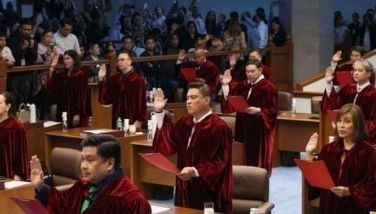Short-term pain, long-term gain
September 7, 2005 | 12:00am
A year after food and beverage conglomerate San Miguel Corp. embarked on a massive "internationalization" bid across the Asia-Pacific, the company bagged a handful of ventures that raised its stature as a regional player both in terms of revenues and geographic presence.
Of the six acquisitions made, two – National Foods and Berri – are expected to create the most immediate and significant impact this year, although these have to trade short-term pains for long-term gains. These forward-looking ventures come at a considerable price: cash (and the forgone interest on it) and debt (together with the financing charges associated with it), or a combination of both.
National Foods was purchased at roughly $1.5 billion while 51 percent of Berri was acquired for about $100 million. These businesses, however, generate an annual revenue of at least $1.3 billion between them based on previous performances. On top of this, San Miguel is expecting significant savings from existing synergies between the two operations.
Briefly, National Foods is the only truly national market milk company in Australia with its flagship Pura brand manufactured and sold in all states. The company is a market leader in fresh milk and produces a range of full cream, flavored and modified fresh and UHT milks, leading brands Pura, Pura Light Start, Masters, Farmers Union and Classic. It is also the leader in the dairy foods sector where the company manufactures yogurt, fromage frais, dairy desserts, cream and cheese under brands that include Yoplait, Fruche, Divine Classic, YoGo and Farmers Union.
Meanwhile, Berri juices an approximate 150,000 tons (287 million lbs) of fresh citrus fruit annually though its products ranging from a mix of fresh juices and fresh drinks, long life juices and drinks to mineral water, still water, fruit cordials and carbonated beverages. The company’s brands include Berri, Daily Juice, Australian Fresh, Just Juice, Mildura Sunrise and Mr. Juicy. Apart from juices, Berri also produces bottled water under its Kyneton Mineral Water and Summit water brands.
Currently, Berri has five major manufacturing plants operating throughout Australia as well as from 11 separate locations across the continent. It controls the largest distribution network in that country, where two-thirds of the total juice trade is being channeled, as well as the organized convenience channel.
Already, with these in the bag, San Miguel should deliver another strong performance by year’s end, with combined revenues from both acquisitions estimated at $720 million.
Moreover, if you examine these transactions closely, they are geographically dispersed operations around the Asia-Pacific and in diverse businesses (i.e. dairy products, non-alcoholic beverages, state-of-the-art packaging formats, new liquor blends) that spread the company’s risks yet expand the revenue stream.
If you ask me, these are not anxious moments for San Miguel but exciting times given the path it has chosen.
What’s with the transportation department’s inaction?
Here is the Asia’s Emerging Dragon Corp. (AEDC), with the biggest names in Philippine business behind it, offering to pay the government the actual construction cost of NAIA International Passenger Terminal 3 (IPT 3) and to make it operational. All it is asking the DOTC is to immediately resolve the disputes and claims of the various parties, including AEDC’s rights to operate it by virtue of an existing contract with the department. But six months after the DOTC received a copy of the request, Secretary Leandro Mendoza has yet to act.
Last March 14, AEDC through its lawyers, pointed out to Mendoza that in the light of the Supreme Court’s nullification of the award to Piatco and all the concession agreements and supplemental contracts over IPT 3, AEDC bring the original proponent of the build-operate-transfer project has the perfected and vested legal right to operate it.
AEDC’s claim has legal basis. For one, its unsolicited proposal was accepted by NEDA with the favorable endorsement of the Investment Coordinating Committee. DOTC and AEDC have entered into a memorandum of agreement for the immediate implementation of the project on the basis of which the parties became bound by their respective commitments subject only to certain procedural requirements.
Because the BOT law requires AEDC’s unsolicited proposal to be subjected to comparative proposals through public bidding, Piatco which offered a better bid was awarded the contract on July 12, 1997 to construct and maintain the facility. But the High Tribunal has spoken. Such nullification, according to AEDC’s lawyers, eliminated any successful challenge to AEDC’s proposal and thus placed the latter to its legal position prior to July 12, 1997 as the legitimate and unchallenged bidder.
AEDC adds that the construction of the terminal by Piatco cannot deprive AEDC of its right to operate IPT 3, but merely created an obligation on the part of AEDC to assume the payment of just compensation once determined to government.
Because of the difficulty in determining the actual amount spent in the construction of the terminal because of Piatco’s refusal to open its books, AEDC lawyer Perfecto Yasay recommends that the formula approved by government in accordance with AEDC’s original proposal be adopted, being the most beneficial to government and the public interest. And according to sources, AEDC will not pay more than $300 million which is based on the amount which Japanese contractor Takenaka Corp. says was actually spent for the construction.
In a follow-up letter sent last Sept. 1, AEDC took exception to the reported buyout by the Manila Hotel Corp. of Fraport’s interest in Piatco for $200 million, saying that from all indications, government has disregarded and ignored its claim by giving imprimatur to the deal as shown by various news reports containing statements of support and endorsement from several government officials.
Yasay claims that it is evident that the Manila Hotel-Fraport deal is a government-sanctioned scheme to enable Piatco to circumvent the Supreme Court ruling. Because how on earth can Manila Hotel, by buying into Piatco, have the right to operate IPT 3 when Piatco’s right to operate no longer exist. And giving Manila Hotel such right would be illegal because it would amount to an award of a franchise to operate the terminal facility without the benefit of a bidding as required by law.
If Manila Hotel’s right to operate IPT 3 has no legal basis whatsoever, then what’s keeping DOTC and government for that matter from giving the right to AEDC? One doesn’t have to be a rocket scientist to sense that something is very wrong about all these. Is Piatco holding our government hostage as some reports would suggest? If not, then why is government wittingly becoming a tool in circumventing the Supreme Court ruling on IPT-3 and in protecting Piatco at all costs?
For comments, e-mail at philstarhiddenagenda@yahoo.com
Of the six acquisitions made, two – National Foods and Berri – are expected to create the most immediate and significant impact this year, although these have to trade short-term pains for long-term gains. These forward-looking ventures come at a considerable price: cash (and the forgone interest on it) and debt (together with the financing charges associated with it), or a combination of both.
National Foods was purchased at roughly $1.5 billion while 51 percent of Berri was acquired for about $100 million. These businesses, however, generate an annual revenue of at least $1.3 billion between them based on previous performances. On top of this, San Miguel is expecting significant savings from existing synergies between the two operations.
Briefly, National Foods is the only truly national market milk company in Australia with its flagship Pura brand manufactured and sold in all states. The company is a market leader in fresh milk and produces a range of full cream, flavored and modified fresh and UHT milks, leading brands Pura, Pura Light Start, Masters, Farmers Union and Classic. It is also the leader in the dairy foods sector where the company manufactures yogurt, fromage frais, dairy desserts, cream and cheese under brands that include Yoplait, Fruche, Divine Classic, YoGo and Farmers Union.
Meanwhile, Berri juices an approximate 150,000 tons (287 million lbs) of fresh citrus fruit annually though its products ranging from a mix of fresh juices and fresh drinks, long life juices and drinks to mineral water, still water, fruit cordials and carbonated beverages. The company’s brands include Berri, Daily Juice, Australian Fresh, Just Juice, Mildura Sunrise and Mr. Juicy. Apart from juices, Berri also produces bottled water under its Kyneton Mineral Water and Summit water brands.
Currently, Berri has five major manufacturing plants operating throughout Australia as well as from 11 separate locations across the continent. It controls the largest distribution network in that country, where two-thirds of the total juice trade is being channeled, as well as the organized convenience channel.
Already, with these in the bag, San Miguel should deliver another strong performance by year’s end, with combined revenues from both acquisitions estimated at $720 million.
Moreover, if you examine these transactions closely, they are geographically dispersed operations around the Asia-Pacific and in diverse businesses (i.e. dairy products, non-alcoholic beverages, state-of-the-art packaging formats, new liquor blends) that spread the company’s risks yet expand the revenue stream.
If you ask me, these are not anxious moments for San Miguel but exciting times given the path it has chosen.
Here is the Asia’s Emerging Dragon Corp. (AEDC), with the biggest names in Philippine business behind it, offering to pay the government the actual construction cost of NAIA International Passenger Terminal 3 (IPT 3) and to make it operational. All it is asking the DOTC is to immediately resolve the disputes and claims of the various parties, including AEDC’s rights to operate it by virtue of an existing contract with the department. But six months after the DOTC received a copy of the request, Secretary Leandro Mendoza has yet to act.
Last March 14, AEDC through its lawyers, pointed out to Mendoza that in the light of the Supreme Court’s nullification of the award to Piatco and all the concession agreements and supplemental contracts over IPT 3, AEDC bring the original proponent of the build-operate-transfer project has the perfected and vested legal right to operate it.
AEDC’s claim has legal basis. For one, its unsolicited proposal was accepted by NEDA with the favorable endorsement of the Investment Coordinating Committee. DOTC and AEDC have entered into a memorandum of agreement for the immediate implementation of the project on the basis of which the parties became bound by their respective commitments subject only to certain procedural requirements.
Because the BOT law requires AEDC’s unsolicited proposal to be subjected to comparative proposals through public bidding, Piatco which offered a better bid was awarded the contract on July 12, 1997 to construct and maintain the facility. But the High Tribunal has spoken. Such nullification, according to AEDC’s lawyers, eliminated any successful challenge to AEDC’s proposal and thus placed the latter to its legal position prior to July 12, 1997 as the legitimate and unchallenged bidder.
AEDC adds that the construction of the terminal by Piatco cannot deprive AEDC of its right to operate IPT 3, but merely created an obligation on the part of AEDC to assume the payment of just compensation once determined to government.
Because of the difficulty in determining the actual amount spent in the construction of the terminal because of Piatco’s refusal to open its books, AEDC lawyer Perfecto Yasay recommends that the formula approved by government in accordance with AEDC’s original proposal be adopted, being the most beneficial to government and the public interest. And according to sources, AEDC will not pay more than $300 million which is based on the amount which Japanese contractor Takenaka Corp. says was actually spent for the construction.
In a follow-up letter sent last Sept. 1, AEDC took exception to the reported buyout by the Manila Hotel Corp. of Fraport’s interest in Piatco for $200 million, saying that from all indications, government has disregarded and ignored its claim by giving imprimatur to the deal as shown by various news reports containing statements of support and endorsement from several government officials.
Yasay claims that it is evident that the Manila Hotel-Fraport deal is a government-sanctioned scheme to enable Piatco to circumvent the Supreme Court ruling. Because how on earth can Manila Hotel, by buying into Piatco, have the right to operate IPT 3 when Piatco’s right to operate no longer exist. And giving Manila Hotel such right would be illegal because it would amount to an award of a franchise to operate the terminal facility without the benefit of a bidding as required by law.
If Manila Hotel’s right to operate IPT 3 has no legal basis whatsoever, then what’s keeping DOTC and government for that matter from giving the right to AEDC? One doesn’t have to be a rocket scientist to sense that something is very wrong about all these. Is Piatco holding our government hostage as some reports would suggest? If not, then why is government wittingly becoming a tool in circumventing the Supreme Court ruling on IPT-3 and in protecting Piatco at all costs?
For comments, e-mail at philstarhiddenagenda@yahoo.com
BrandSpace Articles
<
>
- Latest
- Trending
Trending
Latest
Trending
Latest
Recommended






























